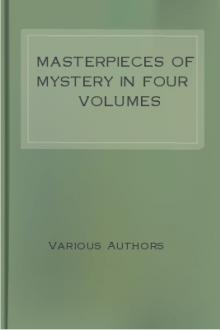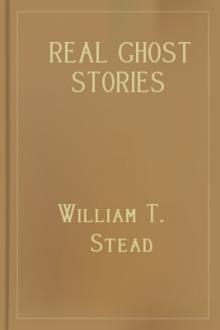Varney the Vampire; Or, the Feast of Blood by Prest and Rymer (ereader iphone .txt) 📗

- Author: Prest and Rymer
Book online «Varney the Vampire; Or, the Feast of Blood by Prest and Rymer (ereader iphone .txt) 📗». Author Prest and Rymer
"Certainly, sir, certainly; I shall only be too happy to answer any questions that may be put to me by a person of your lordship's great intelligence; and all I can remark is, that when you reach the drawing-room floor, any person may truly say, here you have—I really beg your pardon, sir—I had not the slightest intention of saying here you have, I assure you; but the words came out quite unawares, I assure you."
"Peace—peace!" cried again the baron; "you disturb me by this incessant clatter."
Thus admonished, Mr. Leek was now quiet, and allowed the baron in his own way to make what investigation he pleased concerning Anderbury House.
The investigation was not one that could be gone over in ten minutes; for the house was extremely extensive, and the estate altogether presented so many features of beauty and interest, that it was impossible not to linger over it for a considerable period of time.
The grounds were most extensive, and planted with such a regard to order and regularity, everything being in its proper place, that it was a pleasure to see an estate so well kept. And although the baron was not a man who said much, it was quite evident, by what little he did utter, that he was very well pleased with Anderbury-on-the-Mount.
"And now," said Mr. Leek, "I will do myself the pleasure, sir, of showing your grace the subterranean passage."
At this moment a loud ring at one of the entrance gates was heard, and upon the man who had charge of the house answering the summons for admission, he found that it was a gentleman, who gave a card on which was the name of Sir John Westlake, and who desired to see the premises.
"Sir John Westlake," said Mr. Leek; "oh! I recollect he did call at my office, and say that he thought of taking Anderbury-on-the-Mount. A gentleman of great and taste is Sir John, but I must tell him, baron, that you have the preference if you choose to embrace it."
At this moment the stranger advanced, and when he saw the baron, he bowed courteously, upon which Mr. Leek said,—
"I regret, Sir John, that if you should take a fancy to the place, I am compelled first of all to give this gentleman the refusal of it."
"Certainly," said Sir John Westlake; "do not let me interfere with any one. I have nearly made up my mind, and came to look over the property again; but of course, if this gentleman is beforehand with me, I must be content. I wish particularly to go down to the subterranean passage to the beach, if it is not too much trouble."
"Trouble! certainly not, sir. Here, Davis, get some links, and we can go at once; and as this gentleman likewise has seen everything but that strange excavation, he will probably descend with us."
"Certainly," said the baron; "I shall have great pleasure;" and he said it with so free and unembarrassed an air, that no one could have believed for a moment in the possibility that such a subject of fearful interest to him was there to be found.
The entrance from the grounds into this deep cavernous place was in a small but neat building, that looked like a summer-house; and now, torches being procured, and one lit, a door was opened, which conducted at once into the commencement of the excavation; and Mr. Leek heading the way, the distinguished party, as that gentleman loved afterwards to call it in his accounts of the transaction, proceeded into the very bowels of the earth, as it were, and quickly lost all traces of the daylight.
The place did not descend by steps, but by a gentle slope, which it required some caution to traverse, because, being cut in the chalk, which in some places was worn very smooth, it was extremely slippery; but this was a difficulty that a little practice soon overcame, and as they went on the place became more interesting every minute.
Even the baron allowed Mr. Leek to make a speech upon the occasion, and that gentleman said,—
"You will perceive that this excavation must have been made, at a great expense, out of the solid cliff, and in making it some of the most curious specimens of petrifaction and fossil remains were found. You see that the roof is vaulted, and that it is only now and then a lump of chalk has fallen in, or a great piece of flint; and now we come to one of the ice-wells."
They came to a deep excavation, down which they looked, and when the man held the torch beneath its surface, they could dimly see the bottom of it, where there was a number of large pieces of flint stone, and, apparently, likewise, the remains of broken bottles.
"There used to be a windlass at the top of this," said Mr. Leek, "and the things were let down in a basket. They do say that ice will keep for two years in one of these places."
"And are there more of these excavations?" said the baron.
"Oh, dear, yes, sir; there are five or six of them for different purposes; for when the family that used to live in Anderbury House had grand entertainments, which they sometimes had in the summer season, they always had a lot of men down here, cooling wines, and passing them up from hand to hand to the house."
From the gradual slope of this passage down to the cliffs, and the zigzag character of it, it may be well supposed that it was of considerable extent. Indeed, Mr. Leek asserted that it was half a mile in actual measured length.
The baron was not at all anxious to run any risk of a discovery of the dead body which he had cast into that ice-well which was nearest to the opening on to the beach, so, as he went on, he negatived the different proposals that were made to look down into the excavations, and succeeded in putting a stop to that species of inquiry in the majority of instances, but he could not wholly do so.
Perhaps it would have been better for his purpose if he had encouraged a look into every one of the ice-wells; for, in that case, their similarity of appearance might have tired out Sir John Westlake before they got to the last one; but as it was, when they reached the one down which the body had been precipitated, he had the mortification to hear Mr. Leek say,—
"And now, Sir John, and you, my lord baron, as we have looked at the first of these ice wells and at none of the others, suppose we look at the last."
The baron was afraid to say anything; because, if the body were discovered, and identified as that of the visitor at the inn, and who had been seen last with him, any reluctance on his part to have that ice-well examined, might easily afterwards be construed into a very powerful piece of circumstantial evidence against him.
He therefore merely bowed his assent, thinking that the examination would be but a superficial one, and that, in consequence, he should escape easily from any disagreeable consequences.
But this the fates ordained otherwise; and there seemed no hope of that ice-well in particular escaping such an investigation as was sure to induce some uncomfortable results.
"Davis," said Mr. Leek, "these places are not deep, you see, and I was thinking that if you went down one of them, it would be as well; for then you would be able to tell the gentlemen what the bottom was fairly composed of, you understand."
"Oh, I don't mind, sir," said Davis. "I have been down one of them before to-day, I can tell you, sir."
"I do not see the necessity," said Sir John Westlake, "exactly, of such a thing; but still if you please, and this gentleman wishes—"
"I have no wish upon the occasion," said the baron; "and, like yourself, cannot see the necessity."
"Oh, there is no trouble," said Mr. Leek; "and it's better, now you are here, that you see and understand all about it. How can you get down, Davis?"
"Why, sir, it ain't above fourteen feet altogether; so I sha'n't have any difficulty, for I can hang by my hands about half the distance, and drop the remainder."
As he spoke he took off his coat, and then stuck the link he carried into a cleft of the rock, that was beside the brink of the excavation.
The baron now saw that there would be no such thing as avoiding a discovery of the fact of the dead body being in that place, and his only hope was, that in its descent it might have become so injured as to defy identification.
But this was a faint hope, because he recollected that he had himself seen





Comments (0)